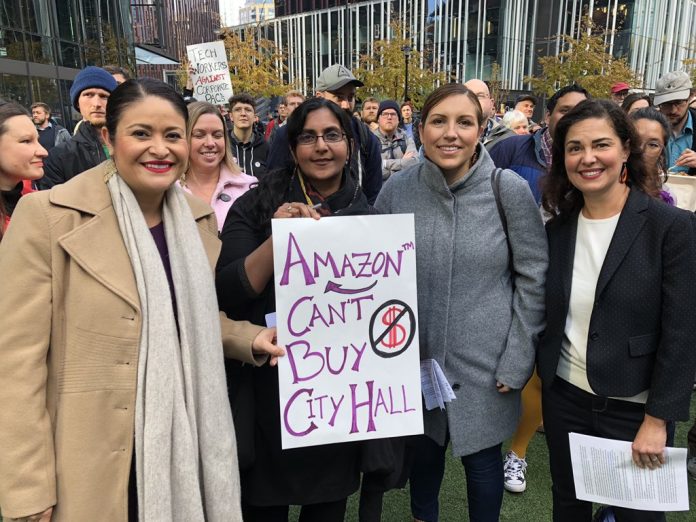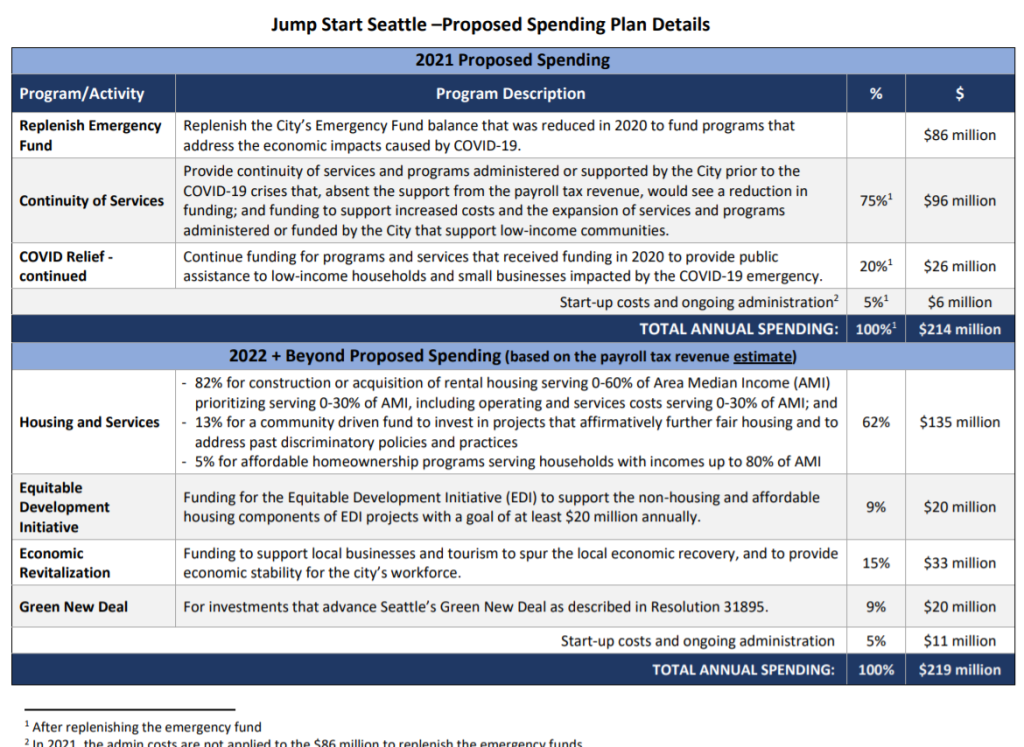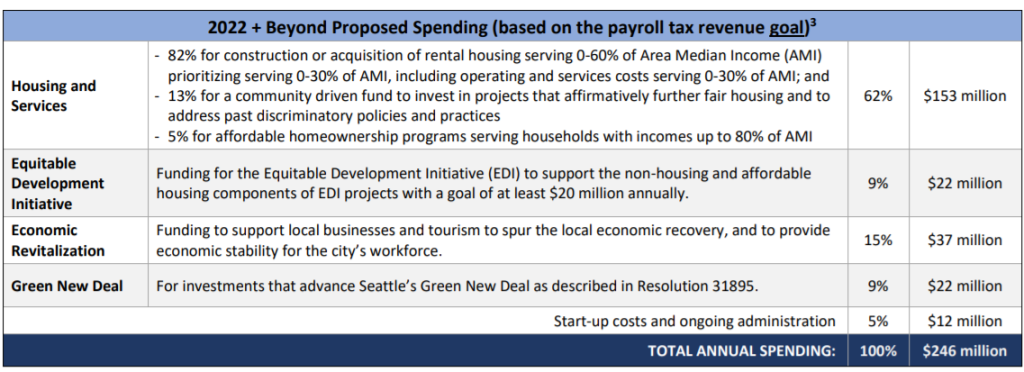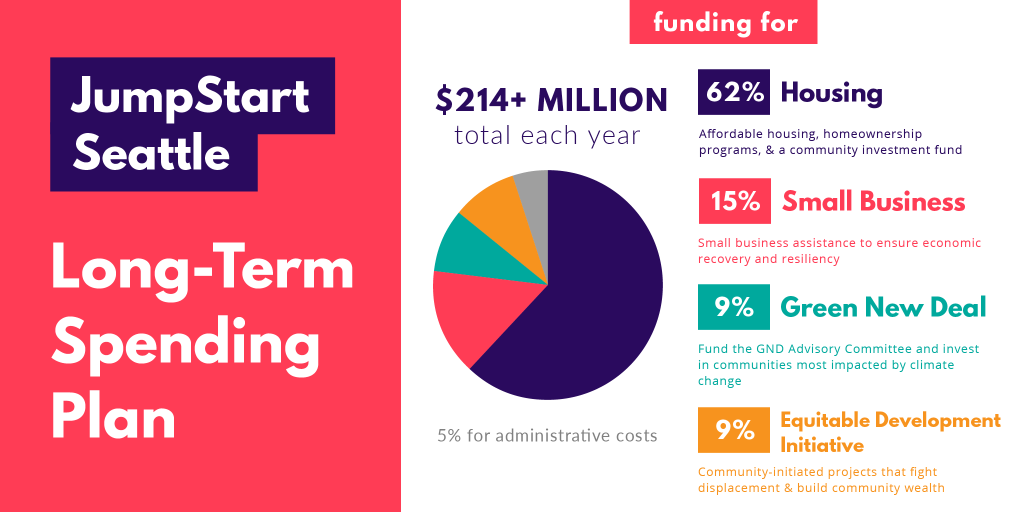
On Monday, the Seattle City Council unanimously approved the spending plan for the JumpStart Seattle payroll tax, which passed 7-2 on July 6th. The plan will act as a roadmap for spending decisions for a tax expected to pull in at least $214 million annually from the wealthiest companies in Seattle. The first year of spending plan focuses on Covid relief for low-income tenants, immigrants, refugees, and small businesses, but the long-term focus is affordable housing production first and foremost, with major investments also planned in the Equitable Development Initiative and the Seattle Green New Deal.
However, councilmembers acknowledged that Mayor Jenny Durkan could ultimately obstruct their spending plan. She has refused to sign the tax legislation and has indicated she won’t sign the spending plan either, but won’t veto it either since the Council has a veto-proof majority on both. The Mayor going the route of obstruction, however, could push the Seattle City Council to proceed with impeaching and removing the Mayor, as thousands of their constituents have urged them to do.
Citing the Mayor’s gaslighting and brutal crackdown on Black Lives Matter protesters, the 36th District Democrats, 37th District Democrats, and 43rd District Democrats all passed resolutions urging Mayor Durkan to resign and advising the Seattle City Council to impeach her if she refuses–making national news. Those three districts represent a majority of Seattle’s population. Meanwhile, a recall Jenny Durkan petition has surpassed 39,000 signatures. Mayor Durkan attempted to pin the calls for her resignation on the supposed machinations of Councilmember Kshama Sawant, who is a member of the Socialist Alternative, frequent critic of the Democratic party establishment, and perennial punching bag for moderate Democrats.
“No, these resolutions were written by Democrats,” 36th District policy director Summer Stinson said. “As much as Mayor Durkan would like to believe she has one person questioning her leadership she needs to face the harsh reality that she has many, many Democrats and unions asking for her to resign.”
Budget Chair and bill author Teresa Mosqueda didn’t sound like she was backing down from a fight during in a fiery speech just before the unanimous Council vote. (Starts around 1:45:00 in the video.)
“While the bill itself was not vetoed, the Mayor has not committed to getting the funding for Covid relief out the door, which is critical,” Mosqueda said. “The critical effort for us all is to make sure the Mayor allocates the Covid relief dollars as specified in this law, because any delay means the consequences for our city’s health and recovery would be dire. It would be a dereliction of duties not to get this out.”
In fact Councilmember Mosqueda even seemed to be sharpening legal and political arguments in case it does come to an impeachment trial–a process which allows the Seattle City Council to remove the Mayor with six votes.
“And by definition dereliction of duties mean a shameful failure to meet one’s obligations,” Mosqueda continued. “It is our obligation to provide immediate relief to those who are facing a Covid crisis. It is our obligation to make sure immigrants and refugees who have been left out of federal assistance get the support they need. It is our obligations to help small businesses open up so they can hire more people when they are given the green light under Covid. And it our obligation to make sure more people can keep a roof over their head and put food on their table…”
Covid relief plan
The approved JumpStart spending plan uses a portion of the City’s emergency “rainy day” funds to begin providing Covid relief this year. The City won’t begin collecting the tax until 2021, meaning it won’t have much money to spend until late into 2021. From the first year of proceeds, $86 million is dedicated toward replenishing the emergency fund, $96 million is pegged for continuity of services imperiled by the funding crisis Covid caused, and $26 million is for ongoing Covid relief to low-income households and impacted small businesses.

Mayor Durkan had sought to portray JumpStart’s Covid relief package as recklessly draining the City’s emergency fund, but she was wrong on both counts. The Council didn’t deplete the fund, knowing some money might be needed in 2021, too, and the first batch of proceeds is directed toward replenishing the emergency fund, anyway. Some councilmembers asked if 2020 doesn’t qualify for dipping into the emergency fund, what year would?
A major social housing boost
While City projects JumpStart will generate at least $214 million per year, it could actually be more than that due to the impact of the highest tier of the tax on companies with at least one billion dollars in payroll–likely a small club with Amazon and perhaps no one else.
“Due to data limitations, the estimate for the Jump Start Seattle tax authorized through the ordinance introduced as Council Bill 119810 does not include incremental revenue that may be generated from a portion of the rates on any businesses with payroll of $1 billion and above,” City Central Staff note, providing an estimate of an additional $28 million in projected revenue if that billion-dollar tier is triggered adding the following table to break down the augmented spending.

The $153 million per year for affordable housing would be unprecedented in Seattle history. It represents $3 billion over the first twenty years of the plan. Most of that funding is targeted at the lowest end of the income spectrum below 30% and 60% of area median income. Braided with matching funds, 20,000 new affordable homes over JumpStart’s first 20 years seems within reach. This is major progress on Seattle’s affordable housing gap, which has been pegged at 30,000 or more. King County’s affordable housing task force estimated 244,000 new affordable homes are needed countywide by 2040 to ensure none are rent-burdened.
“The Housing Alliance thanks Councilmember Mosqueda and the other councilmembers who joined her in passing this historic bill,” said Rachael Myers, Executive Director of the Washington Low Income Housing Alliance, in a statement. “Leadership and innovation like this is needed now more than ever. Seattle’s homelessness crisis threatens to get much worse due to the economic downturn and the need to invest in affordable housing is even more urgent. Jumpstart will help ensure that Seattle can build safe, healthy and affordable homes that our communities need to prevent and end homelessness.”

I detailed Councilmember Sawant’s promise to build at least 1,000 affordable homes in the Central District via the $20 million set aside for formerly redlined neighborhoods like the Central District (see the redlining map above). The legislation doesn’t expressly promise 1,000 Central District homes to avoid running afoul of the Fair Housing Act and jeopardizing federal and state matching funds. But City staff project the fund to “affirmatively further fair housing” will generate more than 3,000 affordable homes in formerly redlined areas. As such, Sawant’s promise to the Central District is doable, and she’s actually underselling the program’s impact citywide.

Greenlighting the Green New Deal
As Mayor Durkan plotted her opposition, local climate leaders heralded JumpStart Seattle’s investments in the Green New Deal and environmental justice. Specifically, the spending plan dedicates at least $20 million annually to energy efficiency retrofits, switching homes away from oil and gas heating to cleaner and safer electric heating and funding weatherization projects that lower energy bills. “The first phase of the program will prioritize homeowners that make 80% or less of Seattle’s average median income before being opened up to the broader public,” Sierra Club noted. “Outreach will be concentrated in BIPOC (Black, Indigenous and People of Color) communities.”
“This program is one of Seattle’s first steps in implementing a local Green New Deal, a key strategy in meeting the city’s goal of eliminating climate pollution by the year 2030,” Sierra Club said in a press release. “As of 2016, buildings were responsible for 35% of Seattle’s climate pollution, primarily due to the burning of oil and gas in household appliances like water heaters, furnaces and stoves. Statewide, buildings are Washington’s fastest-growing source of greenhouse gases, up by more than 50% since 1990.
“$20 million is a good start but it’s still a start,” said Debolina Banerjee, Climate Justice Policy Analyst at Puget Sound Sage, in a statement. “The climate crisis isn’t going away anytime soon. Once the pandemic comes under control, and people start resuming their usual activities, emissions will rise again, and so will the impacts. There should be more investments in climate issues, especially in communities who are at the frontlines of the climate crisis.”
Retrofitting homes away from fracked gas heating to high-efficiency electric will lower heating bills, carbon emissions, and local pollution impacts.
“This is the right thing to do,” said Maria Batayola, chair of the Beacon Hill Community Council. “Most oil heated homes are located in Central Area, the Duwamish, Beacon Hill, South Seattle and West Seattle where Black, people of color and low income reside. This will be very helpful.”
Lucas Vargas Zepetello, a community organizer with 350 Seattle, echoed that sentiment: “This plan will create local clean energy jobs that will help make good on the council’s commitment to eliminate carbon emissions in Seattle. It ensures communities already most impacted by the climate crisis and economic injustice are served first.”
Doug Trumm is publisher of The Urbanist. An Urbanist writer since 2015, he dreams of pedestrian streets, bus lanes, and a mass-timber building spree to end our housing crisis. He graduated from the Evans School of Public Policy and Governance at the University of Washington in 2019. He lives in Seattle's Fremont neighborhood and loves to explore the city by foot and by bike.


